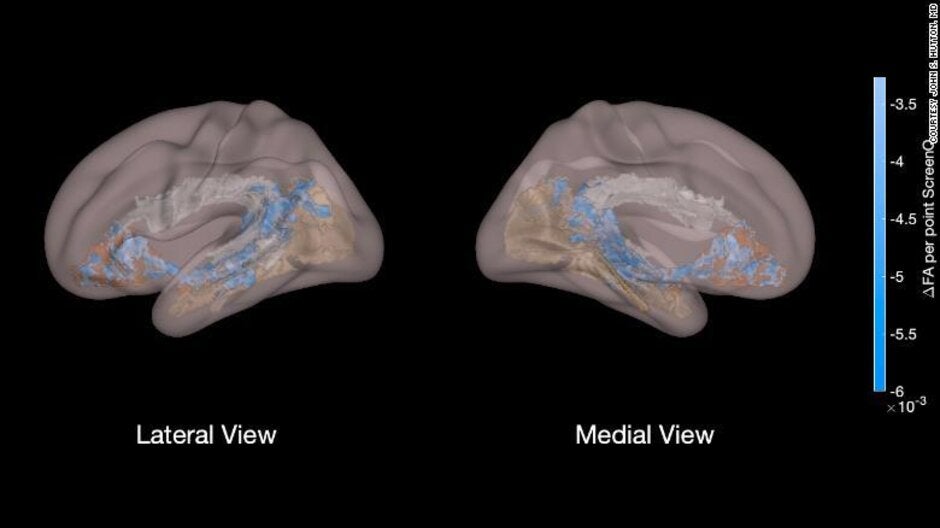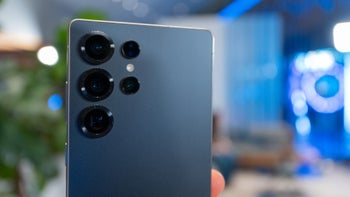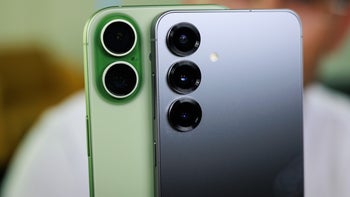Study reveals why tablets and phones are dangerous babysitters

If you're one of those parents who use a smartphone or a tablet as an electronic babysitter, you might want to hear about a study that was published today in the Journal of the American Medical Association (JAMA) Pediatrics (via CNN). The study measured the effects on 47 healthy prekindergarten children (3 to 5 years of age) of screen use greater than the one hour per day recommended by the American Academy of Pediatrics.
Scans done of these children revealed that those who were placed in front of a screen for more than one hour per day without their parents being involved had a problem with the white matter of their brains. The kids tested were found to have lower levels of white matter development; this is an area of the brain that is important to the development of skills related to language, literacy and cognitive abilities. In other words, too much time spent in front of a phone, tablet, computer and television could make it harder for children to develop communication skills and might hinder their abilities to solve problems.
One of the issues that today's children face that wasn't seen 10 years ago is the portability of screens. Sure, cellphones were around for longer than a decade, and the touchscreen smartphone became a thing in 2007. But arguably, it wasn't until the launch of the Apple iPad in 2010 that parents discovered how tablets made for an effective babysitter. Load up some videos for the kids to watch and some pre-school games they can play and even the most rambunctious kid can sit through a dinner at a nice restaurant. Amazon has a special kids edition of its Fire Tablet with a kid-proof case; these inexpensive slates offer a subscription to Amazon's FreeTime Unlimited, a service that gives kids access to a multitude of apps, games, books, videos, and educational content from providers like Disney and Nickelodeon.
90% of children have been exposed to screens by the time they are one-year-old.
The study's lead author is Dr. John Hutton, a pediatrician and clinical researcher at Cincinnati Children's Hospital. Dr. Hutton notes "This is the first study to document associations between higher screen use and lower measures of brain structure and skills in preschool-aged kids. This is important because the brain is developing the most rapidly in the first five years. That's when brains are very plastic and soaking up everything, forming these strong connections that last for life." Doctor Hutton also pointed out that kids who sit in front of a screen for five hours usually have parents who sit in front of a screen for 10 hours. As a result, there isn't time for any interaction between the parents and their children.
It might not seem that hard to believe these days, but Hutton states that 90% of children are using screens by the age of one. He noted that in some studies that he's been involved in, kids as young as two or three months old were using screens. The doctor compared the part of the brain that was affected by the overuse of screen time, the white matter, to cables connecting different parts of the brain so that they can communicate. If these cables do not develop correctly, the brain's processing speed can be throttled or slowed down.

The blue color in this photo shows areas of white matter in the brain that are underdeveloped because of excessive screen time. Courtesy of Dr. John Hutton
If you want your kids to partake in activities that can help speed up the development of white matter, some studies show that learning a musical instrument (excellent for a child's development), juggling and reading will help with the structure and organization of the brain's white matter. Kids who used a screen for longer than one hour per day had underdeveloped and unorganized white matter.
While the American Academy of Pediatrics suggests that children 3 to 5 years of age be limited to no more than one hour of screen time each day, it also recommends that babies 18 months old and younger should not be exposed to screen time except to video chat with family and friends.
Follow us on Google News














Things that are NOT allowed:
To help keep our community safe and free from spam, we apply temporary limits to newly created accounts: